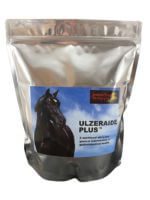
Power Star Nutrition
Gastric Ulcers
Looking for a way to help your horse with gastric ulcers? Ulzeraide Plus may be just what you need! This gastrointestinal supplement helps horses with gastric, gut, and hindgut ulcers, and includes a toxin binder. Give your horse the relief they deserve with Ulzeraide Plus.
Introduction To Equine Gastric Ulcers
Equine gastric ulcers have become a common concern among horse owners and veterinarians worldwide. These painful sores that develop within the horse’s stomach lining can significantly impact the health and performance of affected animals. Gastric ulcers in horses are primarily caused by the modern lifestyle they lead, including factors such as confinement, high-starch diets, intensive training, and limited access to forage.
Stressful situations like transportation or competition can also contribute to their development. Recognizing the signs of equine gastric ulcers is crucial for early detection and treatment. Horses suffering from this condition may exhibit poor appetite, weight loss, behavioral changes, decreased performance, or recurrent colic episodes. Prompt diagnosis is essential as untreated ulcers can lead to serious complications and compromise the overall well-being of the animal.
Causes And Risk Factors Of Equine Gastric Ulcers
Equine gastric ulcers, a prevalent condition among horses, are primarily caused by a disruption in the delicate balance of acid production and protective mechanisms within the horse’s stomach. The primary risk factor for developing gastric ulcers is prolonged exposure to an empty stomach, as horses are natural grazers designed to have a constant flow of forage through their digestive system. Additionally, high-stress environments such as intense training or competition can increase the likelihood of ulcer formation due to heightened cortisol levels and reduced blood flow to the stomach lining.
Other contributing factors include a high concentrated diet with limited roughage intake, irregular feeding schedules, and prolonged use of non-steroidal anti-inflammatory drugs (NSAIDs). Inadequate turnout time or social interaction may also lead to increased stress levels that contribute to ulcer development. Recognizing these causes and risk factors is crucial for implementing preventive strategies and maintaining equine gastrointestinal health.
Symptoms And Diagnosis Of Equine Gastric Ulcers
Equine gastric ulcers are a common condition that affects the stomach lining of horses. Recognizing the symptoms and diagnosing these ulcers is crucial for effective treatment. One of the most prominent symptoms of equine gastric ulcers is a change in appetite. Horses with ulcers may show reduced interest in food, leading to weight loss and poor body condition. Additionally, they may exhibit signs of discomfort such as frequent pawing at the ground, teeth grinding, or biting at their sides.
Diagnosing equine gastric ulcers often involves a combination of clinical signs and diagnostic tests. Veterinarians may conduct a thorough physical examination to check for any abnormalities in behavior or appearance. They might also perform an endoscopic examination, which involves passing a flexible tube with a camera into the horse’s stomach to directly visualize any ulcerations.
Treatment And Prevention Of Equine Gastric Ulcers
Treatment and prevention of equine gastric ulcers involves a multifaceted approach that addresses both the underlying causes and the symptoms. To treat existing ulcers, medications such as proton pump inhibitors or histamine type-2 receptor antagonists may be prescribed to reduce stomach acid production and promote healing. Additionally, sucralfate, a protective medication, can be administered to create a barrier over the ulcerated area and natural supplements – Ulzeraide Plus.
Adjusting the horse’s diet is crucial in preventing ulcers from reoccurring or developing further. Feeding smaller meals more frequently throughout the day reduces stomach acid exposure and helps maintain consistent digestion. Including high-quality forage such as hay or pasture grazing also buffers stomach acid and prevents prolonged periods of fasting. Stress management plays a significant role in preventing ulcers; providing regular exercise, turnout time, social interaction, and minimizing environmental stressors are essential practices.
Showing the single result
-
Ulzeraide Plus – Gut Health, Mycotoxin Binder and Ulcer Prevention
From: $42.00 Select options This product has multiple variants. The options may be chosen on the product page

